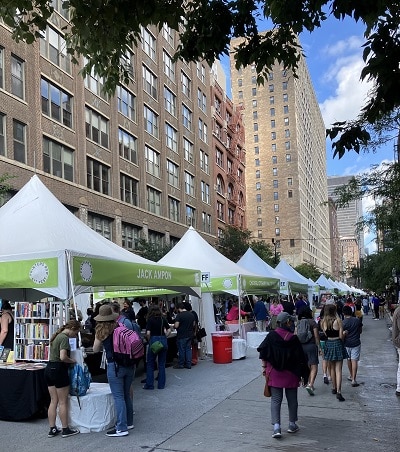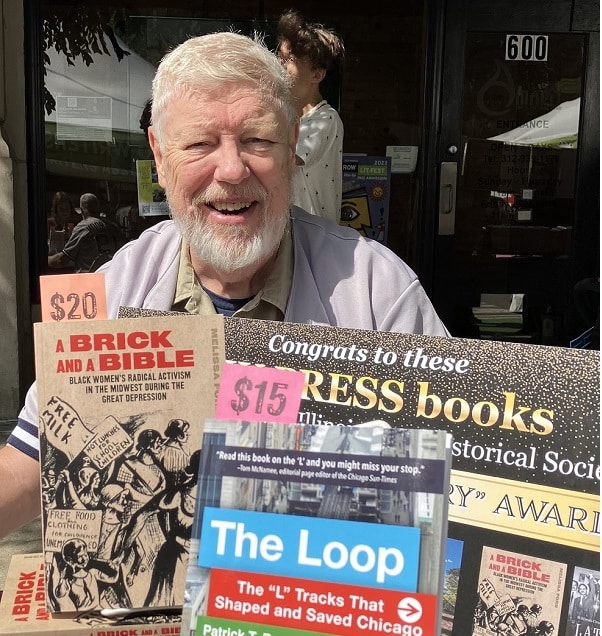Near the end of last Saturday at this year’s Printers Row Lit Fest, an 80-year-old Italian painter from the North Shore told me she’s going to have a huge party if she’s able — as she hopes — to sell one of her paintings in Venice in the next couple weeks. And she’s going to invite me and my wife. Well, thanks.
At another point, I looked up and was startled to see Samuel G. Freedman, a professor at the Columbia University Graduate School of Journalism and author of eight highly praised nonfiction books, standing in front of me and wanting to buy a copy of my book The Loop: The “L” Tracks That Shaped and Saved Chicago. We talked about playing basketball as we did many decades ago when I had my original knees and Sam’s hair was black and much longer and we both worked for Suburban Trib, the suburban operation of the Chicago Tribune.
And there was the proud moment when I swung by the table of After Hours: A Journal of Chicago Writing and Art to pick up my copy of issue number 46 which features my poem “That basement” — but, much more significant, ten poems by the esteemed Black poet and publisher Haki Madhubuti, my friend.
Finding readers

For many years, I attended Printers Row as a Tribune reporter, scouting out stories among the wealth of possibilities that the event offered. In those days, if I could sell a story idea to one of my editors, all I had to do was the research and the writing, and — voila! — it would appear in the paper in the next day or so. And would have hundreds of thousands of potential readers.
It’s not so easy now — now that I’m writing books and showing up to Printers Row as one of hundreds of authors hungry for attention.
As an author, I still have to get an editor-publisher to give the OK to put my book into print. But that’s just the start of the selling. In today’s book marketplace, I have to do everything I can and anything I can think of to get my little creations some readers. Any readers.
Printers Row is, for authors like me, about the mercantile aspects of the business. And, yet, it’s about something much more important. It’s about community.
The community of readers and of writers
It’s about the community of all readers who spend a lot of their time alone with whatever it is that they’re reading.
At Printers Row, now in its 38th year, readers come out of their easy chairs to mingle and feast on a cornucopia of literary riches. It is Chicago’s annual celebration of reading and attracts more than 100,000 people over its two days, serving as a key landmark in the city’s annual literary landscape. The Lit Fest continued Sunday in the Printers Row neighborhood, bordered by Ida B. Wells Drive on the north, Polk Street on the south, Plymouth Court on the east, and the Chicago River on the west.
And if Printers Row is a happy time for readers, it’s an even more joyous weekend for writers who have to spend years, and often many years, creating the books that all those readers come to celebrate.
In addition to the opportunity to maybe sell some books, the festival is a chance to break out of the isolation of putting words down onto paper or screen and renew old friendships and spark new ones.
The Wandering Womb and other books
On Saturday, before setting up to sell my own books, I took a swing on Polk Street and came across a table where Caroline Johnson was promoting the literary group Poets & Patrons and offering her own chapbook Where the Street Ends for sale. We talked, and she wanted to give me the book for free. I paid for it.
It seemed the right thing to do, especially when I paged through it and I enjoyed her lines in “Seasons of Love”: “When it’s spring we sit outside on the porch,/I read Paradise Lost and we speak/a foreign tongue./You reach across/to touch my hair.”
At another table was S.L. Wisenberg, the editor of Another Chicago Magazine and author of several non-fiction books. We’ve known each other with a passing acquaintanceship since sometime in the 1990s, but, for the first time, I had the chance to tell her how great her book titles are, such as Holocaust Girls: History, Memory, and Other Obsessions, and The Adventures of a Cancer Bitch, and her latest The Wandering Womb: Essays in Search of Home. I own the first two and, on Saturday, bought the new one.
Selling and not selling
Part of the time Saturday, I was stationed at the tables of Southern Illinois University Press, the publisher of my 2020 book The Loop. I was able to sell and sign more than 20 copies, and, as has happened in other years, I found that many people love to talk about the Loop and Chicago history. I also got to meet several other SIU Press authors whose work I have admired.

At other times, I was at the tent of the Society of Midland Authors where I set up to sell four of my poetry books. Alas, people — at least those walking by the tent for the two hours I was there — are much less interested in talking about and reading poetry than the Loop. I sold only one book.
Also, my marketing may not have been as savvy as it should have been. I found myself thinking that I was asking too much for the books, so, on Sunday, when I went back, I cut the prices.
That’s something I can do. I can’t change the covers of the books which together aren’t terribly inviting on a sunny street with literally thousands of other books, most with more colorful covers, as competition.
Three of the four have monochrome covers which are just right for them and for their poems and subjects. But not terribly flashy, I’m afraid.
She told me she loved my poetry
At the Midland Authors tables, I met Carol Fisher Saller — actually, I think we might have met at an earlier Printers Row — and I bought her children’s book The Bridge Dancers for my granddaughter Emma who just turned four.
Originally published in 1991 and featuring illustrations by Gerald Talifero, it tells the story of two Black sisters, one shy and one lively, and how they deal with a potential tragedy. It was a fairly unusual entry into the world of children’s literature when it first came out, but now, newly republished by Saller, it fits into an explosion of children’s literature featuring non-white characters. I think that Emma, whenever she’s ready to read it, will love it.
A short time after I bought The Bridge Dancers, I got to talking with the 80-year-old artist. I never got her full name, but we found our conversation delightful.
At some point, she picked up a copy of my book Darkness on the Face of the Deep and, paging through it, stopped to read one poem and then to tell me she loved my poetry. I gave her the book.
Patrick T. Reardon
9.10.23
This article, in somewhat different form, originally appeared at Third Coast Review on 9.8.23.
Written by : Patrick T. Reardon
For more than three decades Patrick T. Reardon was an urban affairs writer, a feature writer, a columnist, and an editor for the Chicago Tribune. In 2000 he was one of a team of 50 staff members who won a Pulitzer Prize for explanatory reporting. Now a freelance writer and poet, he has contributed chapters to several books and is the author of Faith Stripped to Its Essence. His website is https://patricktreardon.com/.
